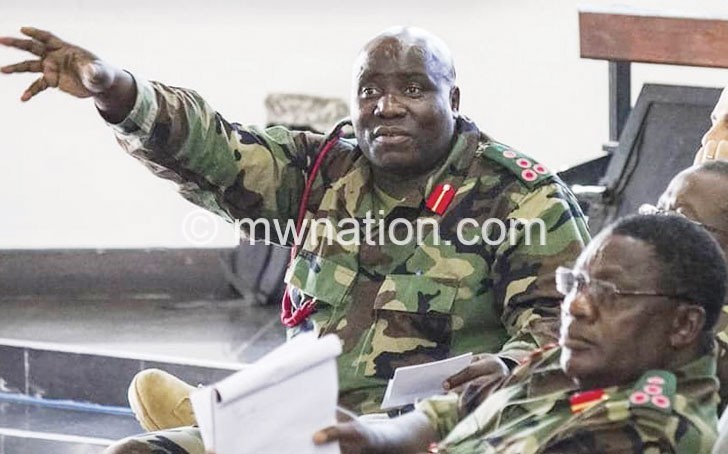Nundwe back as Army chief
Barely five months after General Vincent Nundwe bade farewell to Malawi Defence Force (MDF) following his dismissal by former president Peter Mutharika, the “people’s general” is back at the helm in unprecedented circumstances.
His return followed President Lazarus Chakwera’s bold move on Tuesday to reinstate Nundwe as head of the military to the surprise of security analysts who admitted the decision was unprecedented.

But private practice lawyer Khumbo Bonzoe Soko was quick to clarify, in an interview, that there was no obvious legal complication with the President’s decision.
Delivering a brief address from Kamuzu Palace in Lilongwe, Chakwera did not indicate the new status of Nundwe’s then successor General Peter Namathanga and did not take any questions from the assembled press corps. Namathanga had Davies Mtachi as Deputy Army Commander who replaced Clement Namangale.
Said the President: “Earlier today, I reversed my predecessor’s appointment of a new Commander and Deputy Commander of the Malawi Defence Force.
“As you may recall, in March this year, General Vincent Nundwe was relieved of his command and deployed elsewhere in the public service without justification.

“Although the former president had ultimate responsibility for the Malawi Defence Force as Commander-in-Chief and was vested with powers of appointment pursuant to Section 78 (1), Section 89 (1)(d), and Section 161 (1) and (2) of the Constitution, it was improper to use such powers without cause.
“I have, therefore, redeployed General Nundwe back to the position of Commander of the Malawi Defence Force with immediate effect.
“In doing this, my purpose is to heal the injury and injustice of an unfair decision inflicted on our entire military as a professional institution.”
Chakwera said following what he described as “this corrective decision”, he would convene a meeting of the Defence Council to discuss the appointment of a new Deputy Commander and other measures that Section 161 (4) of the Constitution as read with Section 10 (1) of the Defence Force Act allow the President to implement at the recommendation of the council.
Minutes before the address, vehicle registration MDF 1 and the military escort that normally travels with the MDF Commander were seen speeding out of the gates of the palace after the sixth President flexed his muscle.
Reacting to the development, Nundwe, who had indicated after his dismissal that he was leaving office a happy man, said he was grateful for the re-appointment.
He said it was an opportunity for him to complete what he had started, adding his mission was to ensure that the military serves the interests of the people and nothing else.
Said Nundwe on Tuesday: “God is great. I was removed for doing my job. I am happy that I am back and I will continue from where I stopped; serving Malawians. This is the call to all MDF soldiers to serve Malawians and nothing else.”
But analysts on Tuesday offered mixed reactions to the development which has little precedent in the country’s history.
Mzuzu University-based security affairs expert Eugenio Njoloma described Chakwera’s move as unprecedented and intriguing with both potential positive and negative drawbacks.
He said: “Namathanga appeared he was galvanising the military and the ranks and file had accepted him as Commander, but if the reasoning is that there was flouting of procedures in the removal of the previous Commander, then it was unfortunate then.
“But again, we should check whether the current appointments, too, have equally not flouted the law.”
Njoloma said it would be intriguing to see the reaction of those in the MDF who might have been in line for the job.
“It might sound a popular decision because of Nundwe’s record, but we need to consider whether this appointment can destabilise the military,” he said.
From the legal perspective, Soko observed that both the Constitution and the Defence Force Act do not lay down procedures or grounds for removing a Commander of the MDF.
He said the arrangement in MDF was in sharp contrast to the appointment of the Inspector General of Police where the Constitution has provided for definitive grounds for his removal from office.
Said Soko: “The thinking perhaps was that given the sensitivity of the office of Commander and its importance to national security, the Commander-in-Chief should have wide discretion in deciding who occupies the position.
“The Defence Force Act, however, in Section 191 (5) says that a Commander must serve for four years ‘unless he is sooner removed’. It must be said, however, that the Supreme Court [in General Simwaka v Attorney General] held that a Commander, who is being removed, has a right to be given reasons in writing for the removal in terms of Section 43 of the Constitution.
“I obviously cannot comment on the specific cases of Generals Nundwe and Namathanga as I do not have the full facts as to how each one of them was removed from office.”
When Mutharika fired Nundwe, an official statement said he would be assigned other duties in the public service, but some observers linked his removal to the role MDF played in protecting anti-government protesters who marched against the May 21 2019 presidential election. The High Court nullified the election over irregularities, a decision the Malawi Supreme Court of Appeal upheld, leading to the country’s first court-ordered Fresh Presidential Election on June 23 2020.
Nundwe was the fourth Army Commander Mutharika fired in five years, raising questions about the security tenure at the top of MDF.
Barely weeks in office as Head of State, Mutharika fired General Henry Odillo (Retired) in June 2014 and replaced him with Ignacio Maulana who served for two years before the former president replaced him with Spoon Phiri in July 2016.
Spoon Phiri served up to June 2019 when he was replaced with Nundwe.





